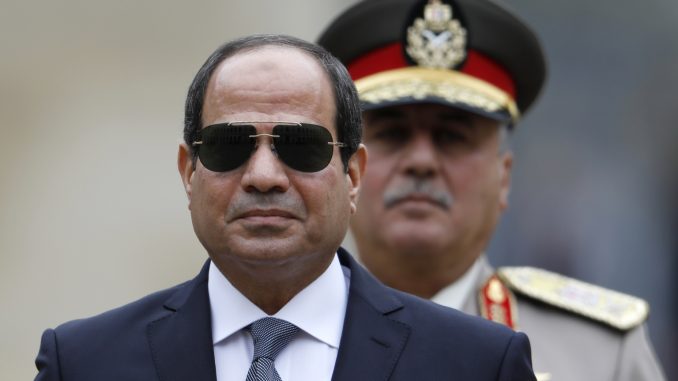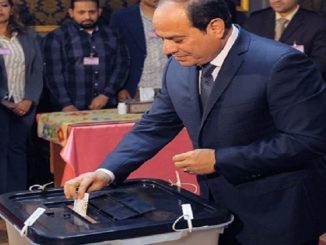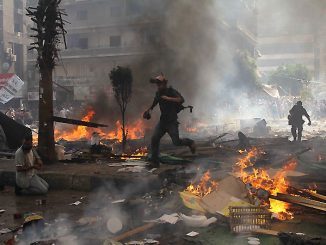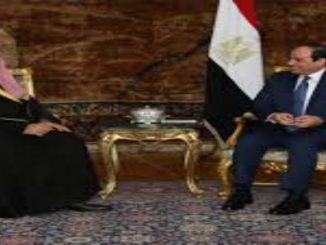
Egypt’s Al-Sisi said he needed $2 trillion to build Egypt. Al-Sisi’s remarks came only days ahead of the country’s presidential election scheduled for next week.
In an interview with Egyptian director, Sandra Nashaat, Al-Sisi said he needed $2 trillion to build Egypt.
Critics have argued that this is an apparent reference to his intention to ask Egyptians to provide him with funds after he wins a second term, to prevent them from demanding an improvement in their situation or complain about the reductions in government subsidies.
Two days ago, Egypt’s Kafr el-Sheikh Governor asked workers to donate one day off from their monthly payroll for “Tahya Masr” government Fund.
On phone interview with CBC (pro-government)channel, Major General Nasr Nasr, governor of Kafr El-Sheikh, said that there are 80,000 officials working in the governorate if they cut off 10 pounds from their salaries, the government will accumulate 7 to 8 million for Long Live Egypt fund.
He also added that those who reject, need to submit a request to be removed from the list, as reported by al-Youm al 7 – the Seventh Day -an Egyptian privately owned daily newspaper.
The Thaya Masr Fund was originally initiated and created by Abdel Fattah al-Sisi in 2014 to help funding projects to support and to revive the cash-strapped national economy.
Throughout his governing, Al-Sisi has asked the Egyptians to donate to national projects as a solution to the country’s economy.
known for his controversial solutions for Egypt’s economy, Al-Sisi once asked the Egyptian bank officials in one of his speeches to find mechanisms to benefit from the “change”(coins as opposed to banknotes) to install them in “small projects for Egypt”.
He said, “Can we take it (the change)? I don’t know how will you do it? I mean that the money change as the 50 piasters and 1 pound in the transactions can be deposited in a special bank account for financing projects and services.”
Al-Sisi added in a speech that was broadcast via the Egyptian state-owned T.V. that Egyptians want to donate to these projects but they don’t know the mechanism.
Al-Sisi continued, “Here is a strong mechanism: we are talking about the transactions of almost 20 or 30 million people daily,” “if the change is 1 pound and 90 piasters, it would reach a huge sum; if we get this “change”, we will have 10 to 12 billion Egyptian pounds.”
“Please, I want this money; but I don’t know how?”
In response, al-Sisi’s initiative has caused a mocking stream through the social networking sites as activists launched a hashtag: “Say Good morning to Egypt and donate your “”change” The hashtag quickly topped the list of comments on Twitter at the time.
At that time, Al-Sisi’s suggestions were mocked by the social media when he asked the Egyptians for donating money to the government to solve Egypt’s economic problems.
On February 24 2016, Al-Sisi said in a speech at al-Galaa Theater, Cairo – where he launched the government’s long-term sustainable development strategy, “Egypt Vision 2030 – that the Egyptian people should donate to the government, saying, “We should all say: “Good morning, Egypt’ and donate one pound,”he said, adding that the Egyptians should support their national economy against foreign threats which seek to destroy Egypt.
One of the most quoted lines from the speech came when Sisi said, “I will use a very difficult expression …If it were possible for me to be sold, I would sell myself.”
At that time, social media users mocked Sisi’s improvised speech for weeks. One prankster even puts Al-Sisi up for sale on the global auction site eBay describing him as a “lightly used field marshal.”
Though Egyptians living abroad have already cast their votes, Al-Sisi has yet to issue and elections manifesto.
The polls will see Al-Sisi facing Musa Mustafa Musa, the leader of Al-Ghad liberal party.
Local and international rights groups condemned Egypt’s presidential elections last week, saying the race would neither be free nor fair.
Politicians say that the Egyptian authorities have manipulated the upcoming elections to guarantee a win for Al-Sisi, who now faces only an obscure politician who supports him as an adversary. But the country’s electoral commission has pledged to run the vote “according to principles of independence, transparency, and objectivity.”



